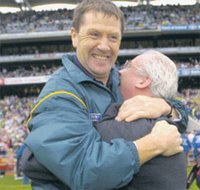The Right Time To Jack It In?
 In the run-up to the most recent All-Ireland final, the, as of yesterday, former Kerry manager, Jack O'Connor pointed out something which I personally had never paused to consider. In talking about the difficulties this season posed for him and his team, in the aftermath of the Munster final defeat to Cork and prior to their rejuvenation at the business end of the season, he mentioned that he was the first Kerry manager since before Mick O'Dwyer to have been neither Micko himself, nor one of the great man's former players.
In the run-up to the most recent All-Ireland final, the, as of yesterday, former Kerry manager, Jack O'Connor pointed out something which I personally had never paused to consider. In talking about the difficulties this season posed for him and his team, in the aftermath of the Munster final defeat to Cork and prior to their rejuvenation at the business end of the season, he mentioned that he was the first Kerry manager since before Mick O'Dwyer to have been neither Micko himself, nor one of the great man's former players. The jist was that O'Connor had to overcome some prejudices within the county and a certain sense that, because he hadn't been anointed within that exclusive coven of legends, he was somehow lesser in their eyes.
Sometimes those of us outwith Kerry's borders can lapse into the lazy belief that everyone within the Kingdom has that innate sense of superiority, that it comes easy to them because of their culture. That a normally undemonstrative man such as O'Connor should mention the troubling nature of this vulnerability and his subsequent satisfaction in proving his credentials is a rare insight into the mechanics of how that Kerry mindset is constructed, proof of the robustness of their standards.
O'Connor can take his place now with the best of them, probably since O'Dwyer himself. Three All-Ireland finals, two Sam Maguires and two league titles in three years will see to that. Also, in going out on top, weeks after his team's ferocious demolition of Mayo, O'Connor ensures his reputation is burnished by the lustre of success and his legacy is a strong and winning Kerry squad.
His three seasons provided separate storylines, each spotlighting O'Connor in some way.
O'Connor's first season was a masterpiece of timing. He wound Kerry up slowly all that championship summer - toiling with Limerick in Munster, burning off Dublin with a short, sharp early second half burst, similarly keeping Derry at comfortable arms length all the way through the semi-final. Then, in the final, he unleashed his team's powers on an epic scale, blowing away Mayo with powder that they had been keeping dry all summer. That Mayo had played their best football two months or so previously only highlighted the perfect curve of Kerry's form graph that summer.
2005 was the year of Tyrone, but there was no shame in Kerry's loss in that final. The Kingdom had carried on their formidable form of the previous year and coasted to the big day in September. They met a Tyrone team who had scrapped their way through, with three frenetic encounters with Armagh under their belts and an epic double-header with Dublin to boot. Also, Tyrone were riding a wave of emotional purpose, the Cormac McAnallen factor and while O'Connor's Kerry went toe-to-toe with them in a close final, there was a sense of destiny about Tyrone that year.
Not that that would have been any consolation in Kerry. As 2006 unfolded with the shock of losing a Munster final to Cork coupled with the mediocrity of their performances, Kerry appeared to have lost their way. Difficult summer months, with rumours of internal strife over selections provided O'Connor with his toughest test as Kerry manager.
The deployment of Kieran Donaghy in the full-forward position from the qualifier against Longford onwards was the single boldest, and most productive, decision of the campaign, especially as the new hero had been sent-off in the drawn Munster final against Cork. The trajectory of the ascent of Donaghy's star has been astonishing, but it was O'Connor who provided the platform for his orbit.
O'Connor's Kerry also put to bed one of modern Kerry football's hoodoos in defeating Armagh in the quarter-finals. Perhaps it was only the desire to do the same to a possibly resurgent Tyrone that stopped O'Connor from stepping down earlier.
That small blemish aside, over the three years of his tenure, O'Connor's team have been clearly Ireland's best side. Both results and the nature of their general performances show that.
He hands over the crown with peace and prosperity in his Kingdom. And he can look any of its former monarchs straight in the eye.






0 Comments:
Post a Comment
<< Home